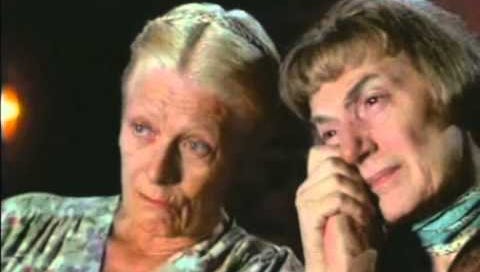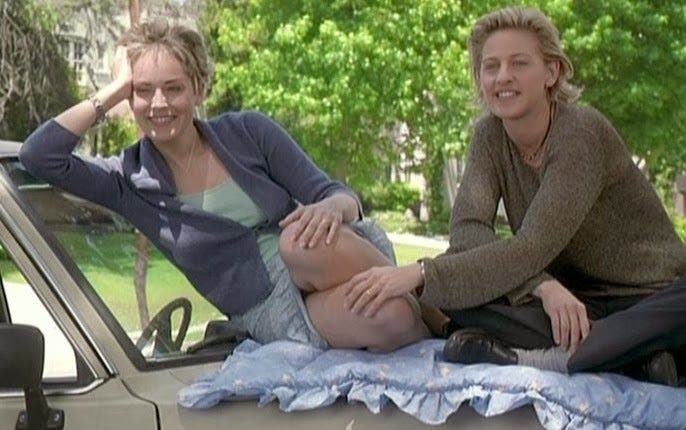1961 - Written and Directed: Jane Anderson
1972 - Directed: Martha Coolidge, Written: Alex and Sylvia Sichel
2000 Written and Directed by: Anne Heche
I was really excited when I first heard about this project. I really enjoyed the first mini-series, and the prospect of a similar concept but with lesbians instead sounded excellent on paper. Unfortunately only two-thirds of it really delivered. It is easiest to deal with this as three separate films, because the quality varied quite dramatically over the course of the three stories.
1961
This was my favourite of the three, though extremely uncomfortable to watch. Who wants to be bitterly reminded of the kinds of treatment we and our partners might have to look forward to when we get older? Because let's face it, anyone who thinks that this story couldn't just as easily happen today is kidding themselves. Edith Tree (Vanessa Redgrave) and Abby, her partner, have lived together since they were young women, sharing every aspect of their lives, being truly married in everything but law. When Abby dies, Edith not only gets forgotten at the hospital, but is invaded by Abby's next-of-kin who insist on selling the house and everything she and Abby have built from under her.
While it isn't really clear if Abby's relatives (with a particularly acid-filled performance by Elizabeth Perkins) know of the nature of Edith and Abby's relationship, it clearly makes no difference to them. The supreme dignity Edith projects whilst faced with such tragedy was overwhelming. Redgrave gives a sympathetic and powerful performance that is guaranteed to leave you in tears.
1972
I was expecting huge things from this second instalment. Penned by the Sichel sisters (All Over Me), and starring Chloë Sevigny who I was awestruck by in Boys Don't Cry, who wouldn't expect big things?
For for the most part it delivers. Linda (Michelle Williams) is a feminist and a proud lesbian. She lives with her equally hard-headed friends (including Natasha Lyonne), decrying the forces of discrimination and prejudice. When Linda falls for young butch Amy (Chloë Sevigny, looking supremely sexy) she is forced to face her own prejudices against lesbians who don't fit her gender nomative ideals.
Michelle Williams was barely removed from Dawson’s Creek at this point, and went on to become an Oscar-winning actress, so this film was where we saw glimpses of what she would become. I was dubious at the thought of seeing her in this type of role, but her willingness to put everything on the line for the role really pays off.
Despite what I thought was some pretty unrealistic and clunky dialogue (the “put on this shirt” scene was utterly ridiculous), the two leads maintained enough chemistry between them to keep the story intriguing. However, it just didn't have the power of the first instalment. That being said, the sex scene between Linda and Amy was pretty full on for the time, and showed the bravery of these actresses at a time when these types of roles were not the norm.
2000
Easily the weakest of the trilogy, Sharon Stone and Ellen Degeneres felt like they were reading a story of two lesbians wanting to become parents directly from cue cards. They had no chemistry as a couple, and Degeneres never managed for a moment to tear herself away from her "Ellen" TV persona.
The two play Fran and Kal, a couple who are desperate to have a baby, and they decide to get artifically inseminated. Thus follows a series of hijinks involving the sperm bank, and some nauseating scenes where Kal basically gives a speech on gay rights to the camera with Fran cooking aimlessly in the background.
People watch shows for the characters and the story, but in between the weak comedy sequences and politicising there wasn't much to watch here. I was especially amused at how Degeneres and Stone managed to have a sex scene for a good five minutes in which the two women seemed like they were utterly embarrassed by having to touch each other intimately. Give me Chloë and Michelle's sizzling scenes any day.
In summary...
If all three of the stories had managed to sustain the intensity, sensitivity and integrity of the first instalment this would have been a film event to be reckoned with. As it was you're left with a vaguely unsatisfied feeling, and a desire to rewind the tape and watch the first part again, just to end it all on a more memorable note.






